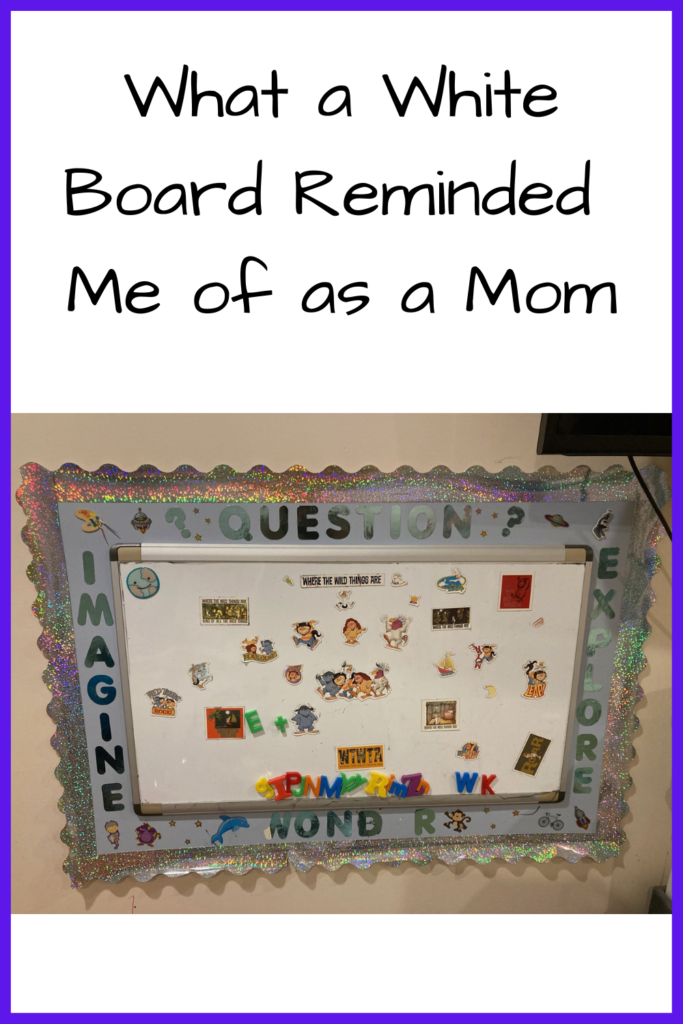
The white board hangs on our basement wall, rather disused. A few letter magnets – an A there, a D there – hang on it, along with a mess of adorable Where the Wild Things Are magnets. In bulletin board letters, the words “Question – Imagine – Wonder – Explore“ posted around it declare its purpose – to inspire questions and inquiry. But while it seems unused, its appearance belies its real impact.
My mom crafted the board for us when my kids were much younger, spurred by my idea – possibly picked up from Pinterest – of a board where we could write down the kids’ questions to look up the answers later. I imagined my sprightly children looking up from their playtime to interrupt my own reading with a thoughtful question about science or history, like children from a storybook. I would then write the question in neat letters on the whiteboard and either answer it right then or vow to look up the answer together later. (In this scenario, they may have also had absolutely nonsensical British accents and called me mummy.)
Of course, reality laughs at what we imagine will happen, especially in parenting. My children are more likely to be yelling random things or fighting each as they are to be quietly playing. Reading my own books around them are difficult at best. And we live in Maryland, so that British accent isn’t happening. (Maybe I should have let them watch more Peppa Pig.)
But the part where they ask lots of thoughtful questions? That part came true – so much more than I expected. The board hasn’t been used much because of the absolute volume and constant-ness of those questions. Like all kids, my kids use questions and their answers to make sense of the world, especially to figure out why things happen. And my kids want to make sense of *everything*.
My kids ask questions anywhere and any when on just about anything. If you’re talking about something, no matter what the subject, they ask questions to understand the topic. If we’re driving down a road, they’ll ask where the name of the road or a business on the road came from. If they’re frustrated or confused about how to use an object, they’ll ask why it’s designed that way. If we’re at a museum or educational center, they’ll ask for explanations. If you make a statement, they’ll ask for an example (“Like what?”) so they can make up their own mind on your opinion.
Unlike my imaginary scenario, I have neither the answers or any way of finding a specific answer out for many of these questions. I remember one particularly befuddling period where one of them kept asking me why the handle on the toilet is where it is on different, specific toilets. I hate BSing an answer that I know is probably wrong, so I usually just say “I don’t know.” Not very satisfying though. Other times, it’s a vague guess like “I suppose they thought it would be good that way” or “maybe they thought it would make money.” But even though my kids aren’t getting any information out of these exchanges, they are learning that adults don’t always know the answers and humble ones are willing to admit it. They’re learning there are some things that it may be impossible to know the answers to – and they’re just going to have to deal with that.
But the questions for which I do know or can look up the answer to have led to some incredible conversations. We’ve discussed racism, climate change, colonialism, poverty, religions, and more. I’ve learned that a main road though our town is named for someone who enslaved a lot of people. He’s also the namesake of their school. (This seems pretty common in areas where people were enslaved because roads are often named for people influential in the community who had a lot of money or land.) Rather than avoiding difficult topics, answering their questions has allowed us to explain these topics spurred by their curiosity. It’s forced me to think about assumptions that I wouldn’t have otherwise.
There are definitely times the questions have gotten tiring. Being asked “why?” about my own actions in particular stretches my patience. But I would never, ever want them to stop asking questions altogether. And I don’t think they will.
So maybe the board has served its purpose, even if not in the way I imagined. The board reminds us of the importance of inquiry and questioning. It’s a symbol of the environment we want our children to grow up in – one that encourages and supports questions, even hard ones. Even though my fantasy of neatly written questions with neatly written answers will never comes to pass, the attitudes and actions we demonstrate to our children really do sink in.